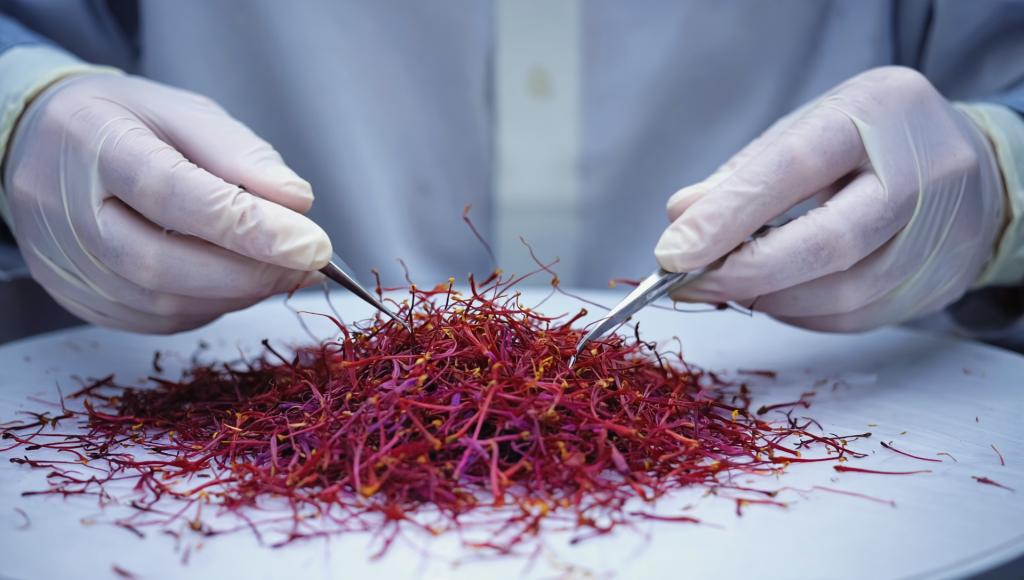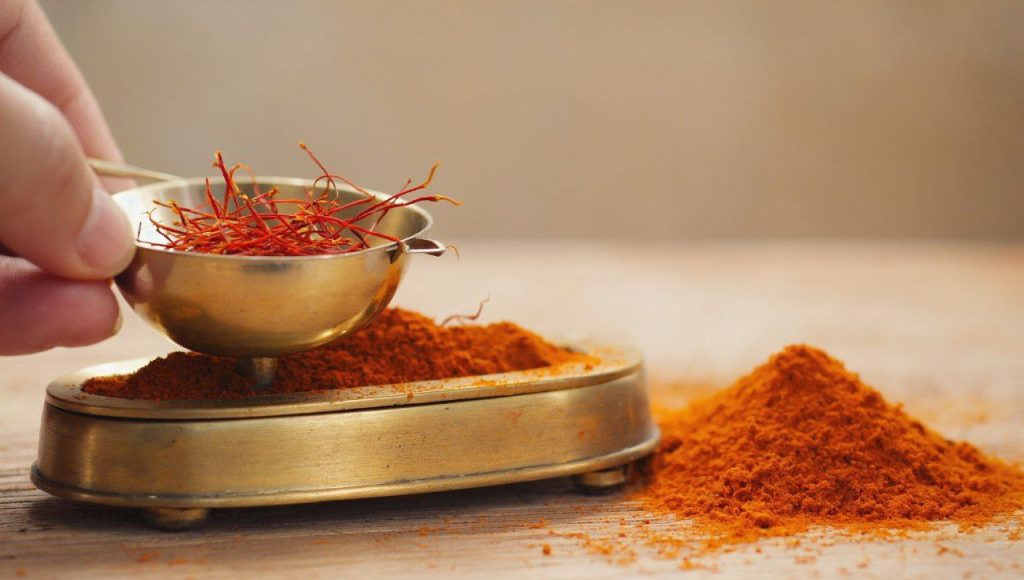Saffron, often called “red gold,” is more than just a spice for cooking. It’s gaining attention for its positive effects as a natural antidepressant. Many people are now exploring saffron for emotional wellness because of its ability to improve mood and reduce stress. Saffron benefits are backed by studies showing it may help ease anxiety and even mild depression. If you’re looking for natural ways to feel calmer, using saffron for stress could be a great option. In this blog, we’ll explore how saffron can support your emotional well-being and why it’s becoming so popular.
What Are the Benefits of Saffron for Emotional Wellness?

Saffron, often called the “golden spice,” can help improve emotional wellness in many ways. Research shows that saffron may help with feelings of sadness, stress, and anxiety. This is because its active ingredients, like crocin and safranal, affect serotonin levels in the brain, which help regulate mood. Taking saffron regularly has been linked to feeling happier, less anxious, and even sleeping better. It’s a natural option for improving emotional well-being.
Saffron also helps the body handle stress more effectively. Studies have shown that it can improve how the body responds to stressful situations, helping people stay calm and balanced. On top of that, saffron can make social interactions feel more enjoyable, which adds to an overall sense of emotional wellness.
In short, saffron is a natural way to boost mood, reduce stress, and improve your quality of life. It’s a simple yet effective option for anyone looking to feel better emotionally.
Substantial Role of Saffron for Emotional Wellness
1. Reducing Anxiety and Depression

Several studies have highlighted saffron’s potential as a natural alternative for managing mild to moderate depression and anxiety. For instance, a review published in Human Psychopharmacology found that saffron supplements were as effective as certain antidepressant medications in improving mood, without the side effects associated with pharmaceutical options.
2. Enhancing Mood

Saffron is sometimes referred to as the “sunshine spice” because of its ability to uplift mood. This is partly due to its influence on serotonin, the neurotransmitter responsible for feelings of happiness and well-being.
3. Improving Cognitive Function

Chronic stress can impair cognitive abilities, such as memory and focus. Saffron’s neuroprotective properties may support brain health and improve cognitive performance, making it easier to manage stress effectively.
The Science Behind Saffron’s Stress-Relieving Properties

Saffron’s potential to alleviate stress is rooted in its rich antioxidant content and active compounds, including crocin, crocetin, safranal, and picrocrocin. These compounds are believed to:
- Combat Oxidative Stress: Chronic stress increases oxidative damage in the body, leading to inflammation and cellular harm. Saffron’s antioxidants help neutralize free radicals, reducing oxidative stress.
- Regulate Neurotransmitters: Research suggests that saffron can modulate serotonin and dopamine levels—neurotransmitters that play a crucial role in mood regulation. By enhancing the balance of these chemicals, saffron may help reduce symptoms of anxiety and depression.
- Lower Cortisol Levels: Cortisol, often called the “stress hormone,” rises during stressful situations. High levels of cortisol over prolonged periods can negatively impact your health. Studies indicate that saffron may help lower cortisol levels, promoting relaxation and emotional stability.
- Promote Better Sleep: Poor sleep is both a cause and effect of stress. Saffron has been linked to improved sleep quality, which in turn supports mental resilience against stress.
If you’re interested in saffron recipes, click the link below to explore five amazing dishes made with saffron: How Much Saffron To Use? A Deep Dive into 5 Delicious Recipes
Can Saffron Improve Mood and Alleviate Depression Symptoms?

Recent studies have highlighted its potential in improving mood and alleviating depression symptoms, making it a fascinating option for those seeking natural wellness solutions. Research has shown that saffron and its active compounds—crocin and safranal—possess antidepressant and anti-anxiety properties. In fact, clinical trials suggest that saffron’s effects are similar to those of popular antidepressant medications like fluoxetine and citalopram, but with fewer reported side effects. This makes saffron for depression a promising alternative for those looking to manage their mood in a safer, more natural way.
While more research is still needed to fully understand how saffron works to boost mood, the evidence thus far points to its potential as an effective and safe treatment for depression and anxiety. If you’re considering saffron for depression, it may be worth exploring as part of your self-care routine to enhance your emotional wellness naturally.
If you’re looking to experience the benefits of saffron, I recommend this trusted website where you can find high-quality saffron products for purchase: goldensaffron.com
Can Saffron Be Used As an Antidepressant?

Saffron for depression is gaining attention as a natural alternative to traditional antidepressants. Renowned for its vibrant color and rich flavor, saffron is believed to help manage depressive symptoms by influencing brain chemicals like serotonin, similar to how conventional antidepressants work. The active compound, crocin, plays a key role in this effect.
Saffron is also known to impact brain-derived neurotrophic factor (BDNF) and CREB protein, both of which are crucial for mood regulation and neural health. BDNF levels are often low in those with depression, and saffron’s ability to boost this factor provides a natural way to support mental wellness. Additionally, saffron’s antioxidants help reduce oxidative stress, which is linked to depression.
While the benefits of saffron for depression are promising, it’s important to note that dosage varies by individual. A typical dose of 30 mg per day is recommended, but it’s best to consult with a healthcare provider before beginning supplementation. Most people report feeling the effects within 4 to 6 weeks of use.
Incorporating saffron into your routine can be as simple as enjoying it in food, sipping saffron tea, or taking supplements. Beyond its antidepressant properties, saffron also offers other health benefits, such as improving heart health, promoting weight loss, and boosting sexual function
Saffron for Emotional Wellness: How Much Should You Use?

For better emotional wellness, studies suggest that consuming saffron may have positive effects on mood. A review of five clinical trials found that saffron, when taken at a dose of 30 mg per day for at least 6 weeks, showed similar results to traditional antidepressant medications like fluoxetine and imipramine. This suggests that saffron and emotional wellness are closely linked, as saffron may be an effective natural alternative for managing symptoms of major depressive disorder. If you’re considering saffron for emotional wellness, it might be worth trying this dosage, but always consult with a healthcare provider before starting any new treatment.
Conclusion
Saffron, the “golden spice,” offers a natural way to enhance emotional wellness by reducing stress, boosting mood, and improving sleep. Its active compounds, like crocin and safranal, help regulate mood-enhancing neurotransmitters and lower cortisol levels, fostering balance and calm.
Whether enjoyed in food, tea, or as a supplement, saffron provides an accessible path to better mental health. Consult a healthcare provider to ensure it fits your needs, and consider incorporating this ancient remedy into your routine for a happier, more balanced life.
References
- https://pmc.ncbi.nlm.nih.gov/articles/PMC7882499/#:~:text=Saffron%20extract%20appears%20to%20improve,of%20stress%2Drelated%20psychiatric%20disorders.
- https://www.verywellhealth.com/saffron-8674415
- https://onlinelibrary.wiley.com/doi/10.1155/2024/6672608
- https://pmc.ncbi.nlm.nih.gov/articles/PMC6266642
- https://nutraceuticalbusinessreview.com/saffron-adaptogenic-plant-mechanisms
- https://pubmed.ncbi.nlm.nih.gov/34438361
- https://pmc.ncbi.nlm.nih.gov/articles/PMC11426294/#:~:text=Research%20suggests%20that,%2C48%5D.
- https://www.sciencedirect.com/science/article/abs/pii/S0165032717315884#:~:text=Several%20interesting%20data%20have%20been,an%20efficacious%20and%20safe%20treatment.
- https://pmc.ncbi.nlm.nih.gov/articles/PMC7882499/#:~:text=A%20meta%2Danalysis%20of,with%20major%20depressive%20disorder
- https://onlinelibrary.wiley.com/doi/abs/10.1002/hup.2434
- https://www.psychologytoday.com/us/blog/inner-source/201601/saffron-emotional-health
- https://www.goldensaffron.com/blog/Saffron/saffron-for-brain-health

